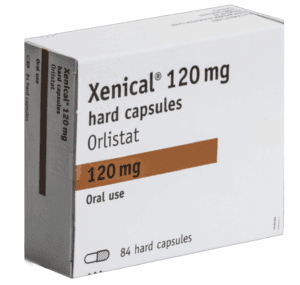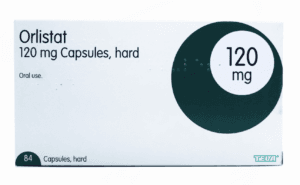Xenical and Orlistat are two widely recognised weight loss medications designed to support individuals in managing their weight effectively. Both medications share the same active ingredient, orlistat, but differ in branding, dosage availability, and cost. With obesity and weight-related health conditions on the rise, choosing the right medication can significantly impact results.
This blog provides a clear weight loss mediation comparison of Xenical and Orlistat, exploring their similarities, differences, dosages, costs, availability, side effects, and regulatory approvals. While both medications are effective tools for weight loss, understanding their nuances will help readers make an informed choice tailored to their needs.
It’s essential to consult a healthcare professional before starting any weight loss medication to ensure safety and suitability for individual health circumstances.
What is Xenical?

Xenical is a prescription medication containing orlistat 120 mg as its active ingredient. It belongs to a class of drugs known as lipase inhibitors, which work by reducing the amount of dietary fat absorbed by the body. Specifically, Xenical blocks enzymes in the digestive system that break down fat, allowing approximately 30% of consumed fat to pass through the body undigested.
Xenical is primarily prescribed to individuals with a Body Mass Index (BMI) of 30 or above, or a BMI of 27 or above if they have weight-related health conditions such as high blood pressure or diabetes.
Clinical studies have shown that when combined with a reduced-calorie diet and regular exercise, Xenical can lead to significant weight loss and improved health outcomes. However, adherence to dietary recommendations is crucial to minimise side effects and maximise effectiveness.
What is Orlistat?

Orlistat is the generic version of Xenical, containing the same active ingredient, orlistat, but available in two strengths: 120 mg (prescription-only) and 60 mg (over-the-counter), often sold under the brand name Alli.
It works in the same way as Xenical by inhibiting lipase enzymes, preventing dietary fat from being absorbed by the body. The undigested fat is then excreted naturally, supporting weight loss when paired with a calorie-controlled diet and consistent physical activity.
Again, Orlistat is suitable for adults with a BMI of 30 or above, or 27 and above if there are additional health risks related to weight.
The key difference lies in its availability: the 120 mg dosage requires a prescription, while the 60 mg version can be purchased over the counter in the UK. This flexibility can make Orlistat a more accessible option for some individuals exploring weight management treatments.
Dosage Strength
Both Xenical and Orlistat share the same active ingredient, orlistat, but their dosage options differ slightly.
- Xenical: Available exclusively as a 120 mg prescription-only medication.
- Orlistat: Comes in two strengths – 120 mg (prescription-required) and 60 mg (over-the-counter, branded as Alli).
The 120 mg Orlistat/Xenical dosage is clinically proven to block around a third of dietary fat absorption and is normally recommended for individuals requiring structured weight loss support under medical supervision. Meanwhile, the 60 mg version of Orlistat is generally aimed at adults looking for an over-the-counter solution to aid moderate weight loss.
While both strengths are effective, adherence to dosage guidelines is essential to avoid side effects and ensure optimal results. Any dosage adjustments or prolonged use should be discussed with a healthcare professional to maintain safety and effectiveness.
Cost
When comparing the cost of Xenical and Orlistat, the most notable difference lies in branding and prescription status.
- Xenical: As a branded medication, Xenical tends to be more expensive. Costs can vary depending on pharmacy pricing, prescription charges, and whether it is covered by insurance plans.
- Orlistat: As a generic alternative, Orlistat is generally more affordable than Xenical. The 60 mg version, available over the counter, is often priced lower than the prescription-only 120 mg version.
In many cases, the effectiveness and safety profile of both medications remain the same, despite the difference in cost. Individuals opting for either option may also find discounts, coupons, or bulk-buy options through online pharmacies or healthcare providers.
While cost can be a deciding factor, it’s essential to prioritise reliability and safety when purchasing weight loss medications, especially from online sources.
Availability
The availability of Xenical and Orlistat differs primarily based on dosage strength and purchase requirements.
- Xenical (120 mg): Available by prescription only in the UK. It can be obtained through GP consultations, licensed online pharmacies, or approved weight management clinics.
- Orlistat (120 mg): Also requires a prescription and is typically available from healthcare professionals or authorised online providers.
- Orlistat (60 mg, branded as Alli): Available over-the-counter without a prescription from pharmacies and licensed online retailers.
When purchasing either medication online, it’s important to ensure the provider is MHRA-approved and displays the appropriate certifications. Unauthorised or unregulated sources may offer counterfeit products, posing serious health risks.
Geographic differences in regulations and pharmacy practices may also influence availability, so checking local guidelines remains essential.
Side Effects
Both Xenical and Orlistat are known to cause similar side effects due to their shared active ingredient, orlistat. These are primarily linked to their mechanism of action, which affects fat absorption Some of the general orlistat side effects vary:
Common Side Effects:
- Gastrointestinal issues such as oily stools, flatulence, and an increased urge to pass stools, especially when dietary fat intake is high.
- Abdominal discomfort or cramps.
Less Common but Serious Side Effects:
- Severe liver injury (extremely rare but possible).
- Symptoms like jaundice, dark urine, or unusual fatigue require immediate medical attention.
The frequency and severity of side effects can vary depending on the dosage and adherence to a low-fat diet. For instance:
- Users of Xenical (120 mg) may experience side effects more intensely if dietary recommendations aren’t followed.
- The 60 mg version of Orlistat is generally associated with milder side effects due to its lower strength.
Adopting a calorie-controlled low-fat diet can significantly reduce unpleasant symptoms. Staying well-hydrated and consulting a healthcare professional about persistent or severe side effects is also recommended.
MHRA Approval
Both Xenical and Orlistat are approved by the Medicines and Healthcare Products Regulatory Agency (MHRA) in the UK, ensuring they meet stringent safety, quality, and efficacy standards.
- Xenical: Approved as a prescription-only medication for individuals with a BMI of 30 or above, or 27 and above if weight-related health risks are present.
- Orlistat: Both the 120 mg prescription version and the 60 mg over-the-counter version (branded as Alli) have received MHRA approval, confirming their safety for public use when taken as directed.
Why MHRA Approval Matters:
- Ensures medications meet clinical safety requirements.
- Confirms the effectiveness of the active ingredient (orlistat).
- Provides clear guidelines on proper use, dosage, and potential side effects.
Both medications are also required to include detailed patient information leaflets (PIL), offering clear guidance on dosage, side effects, and safe usage.
Consumers should always check for the MHRA logo when purchasing medications online or in-store to ensure they are receiving a regulated product.
When comparing Xenical and Orlistat, it’s clear that both medications share the same active ingredient and mechanism of action, effectively supporting weight loss by reducing fat absorption.
- Xenical (120 mg) remains a prescription-only option, often chosen for individuals requiring structured medical oversight.
- Orlistat offers greater flexibility, with both 120 mg (prescription) and 60 mg (over-the-counter) versions available, making it more accessible for those seeking weight management support.
While Xenical may be more expensive due to its branded status, generic Orlistat often offers a more affordable alternative without compromising effectiveness.
Both medications are MHRA-approved, ensuring they meet strict safety and efficacy standards. However, success with either relies heavily on adhering to dosage guidelines, maintaining a balanced diet, and seeking advice from a healthcare professional when needed.
Ultimately, your prescription weight loss options between Xenical and Orlistat come down to individual needs, preferences, and medical circumstances. Consulting a healthcare provider, like ourselves here at WePrescribe, will help determine which option aligns best with your personal weight loss goals.


